As governance expectations of the sector increase, many not-for-profit boards are considering director remuneration as a way to attract and retain directors.
One of the not-for-profit (NFP) sector’s greatest assets is the willingness of individuals to give their time on a voluntary basis in a number of roles, including as directors. The great majority of NFP directors are unpaid, representing an enormous contribution of time, skills and expertise to the sector.
Against this backdrop, the NFP sector is experiencing a period of unprecedented change. There is massive reform to the regulatory environment, models of government funding are being disrupted or completely redesigned, and the operational setting for NFPs is increasingly complex.
Good governance has never been more important for the NFP sector. The performance of directors is central to providing the quality of governance that NFPs need to meet the demands of their changing environments.
In this context, expectations of directors across the sector are being realigned and director remuneration has come into focus for many boards.
Current rates of NFP director remuneration
The Australian Institute of Company Directors (AICD) has been conducting research into the NFP sector for more than seven years through our NFP Governance and Performance Study (the Governance Study).
For the past five years, we have asked NFP directors questions about remuneration.
During this time, the percentage of directors that are paid has remained relatively stable.
Approximately 15 per cent are paid; 24 per cent are reimbursed for expenses only; 3 per cent are paid an honorarium; and 56 per cent are unpaid.⁵ Taken together, 80 per cent of NFP directors are either unpaid or receive reimbursements only.
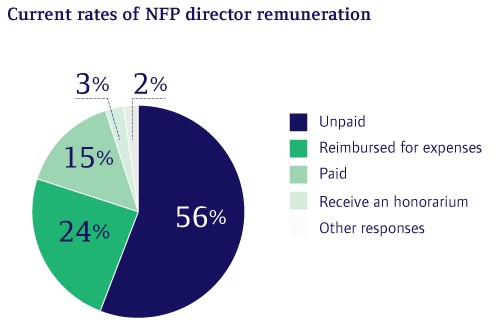
The 2016 AICD Remuneration Survey reflects slightly higher rates of payment (63 per cent unpaid, 37 per cent paid), likely owing to self-selection bias in the study where participants receiving fees are more likely to respond.
There is a strong correlation between the size of the NFP and the payment of directors. Our research shows that 29 per cent of directors from organisations with annual income over $20 million are remunerated. By comparison, as few as 2 per cent of directors from organisations with annual income under $250,000 are remunerated.
This clearly reflects the different levels of complexity and sophistication in governance between organisations of different size and the associated expectations of directors.
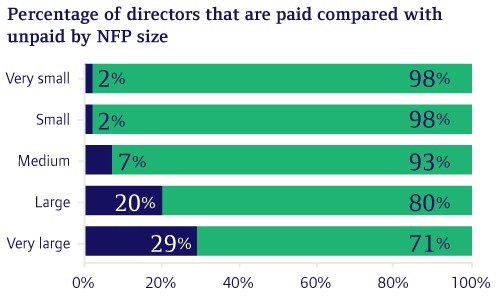
Increasing number of boards considering paying directors
Although figures reflecting director pay have remained relatively static, there is a growing interest in considering remuneration among NFP boards. As part of the Governance Study, we sought directors’ views on whether they were considering remuneration on their boards.
Of directors of NFPs not paying fees, 16 per cent said that remuneration had been discussed in the last year.
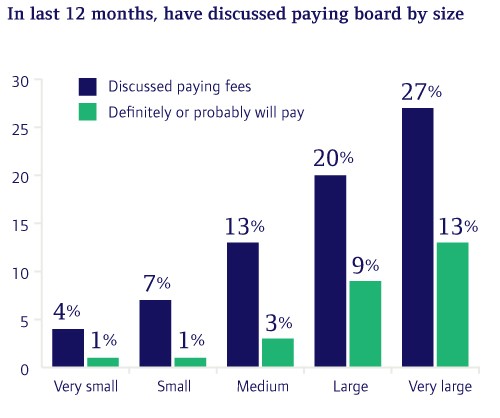
Unsurprisingly, larger boards were more likely to have discussed or committed to remunerating directors within the next 12 months.
Reasons to consider remuneration
As the sector grows and becomes more complex, a more sophisticated approach to governance is required to meet the demands of an increasingly challenging environment.
Many NFPs are growing, either organically or through merger. More than a third of directors in the Governance Study (35 per cent) reported that their organisation had discussed a merger in the last 12 months, 8 per cent reported that they were currently undertaking a merger and 6 per cent had completed a merger in the past year.
As NFPs scale up, the expectations of governance increase. The level of skill required to govern larger organisations is generally higher, and with this comes additional responsibility and often demands a greater contribution of time.
This leads some boards to consider whether the calibre of director they require can be attracted and retained on a voluntary basis. This sentiment was reflected in the Governance Study which demonstrates that higher expectations of governance performance are the key drivers in considerations of director remuneration.
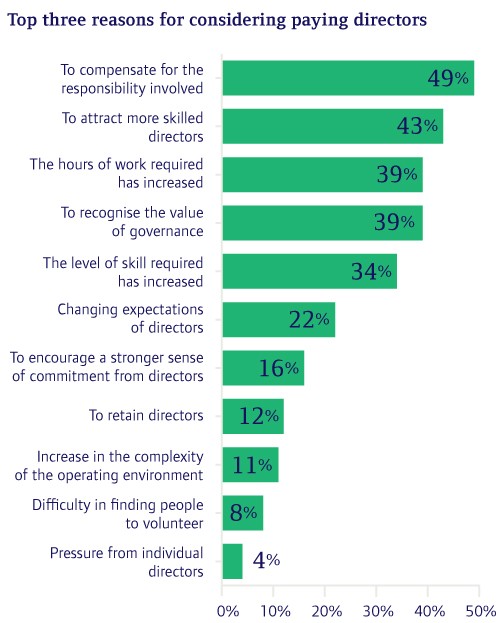
These priorities reflect a trend towards directors spending more time on their NFP directorships. In 2013, 13 per cent of directors reported spending more than 5 days a month on a given NFP. By 2016, that number had grown to 19 per cent. This trend reflects the growing demands on NFP directors’ time and expertise.
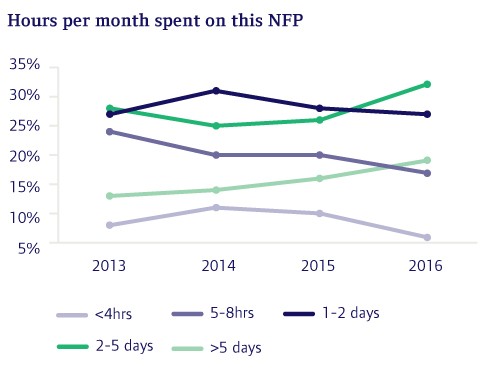
Remuneration, admin costs and the starvation cycle
One of the most significant influences on boards’ decisions around remuneration in the NFP sector is the growing and sometimes intense focus on administration costs. Administration costs refer to costs that are not directly related to delivering services.
Administration costs contribute very little to our understanding of the performance of an NFP. They are subjective, difficult to compare between entities and do not provide a true or complete picture of an NFP’s impact. Despite this, there is significant attention on admin costs within the sector, among government, the media and the broader community. As a result, many NFPs seek to reduce their spending on administration to appear more attractive to funders and donors.
This influence causes NFPs to spend less on overheads such as information technology, staff development and training, assets and, indeed, remuneration of directors. Underinvestment in essential business infrastructure impairs an NFP’s ability to achieve an impact and, in turn, means it will require more resources to achieve the same in a harmful cycle. This has been creatively termed: ‘the starvation cycle’.
The focus on administration costs can have a disproportionate influence on a board’s deliberations around remuneration. Many boards will consider that director remuneration may not be positively received by stakeholders. There is a sense among some directors that remuneration could discourage donors (or funders) who may not want their contribution going towards roles that could be filled by volunteers.
Directors must ensure that any decisions concerning remuneration are clearly communicated to stakeholders and any proposed benefits are well articulated.
In 2016, NFPs are often efficient, highly sophisticated, impactful organisations. They operate in complex and challenging contexts and have operational and governance challenges similar to those faced by their commercial counterparts.
As the sector grows, expectations of governance will continue to increase. Good governance has never been more important for NFPs, and a mature and practical attitude towards director remuneration is critical to ensure an appropriate level of governance within the sector.
Latest news
Already a member?
Login to view this content


